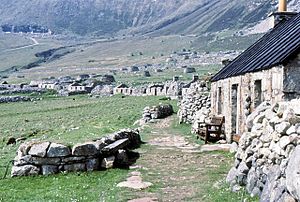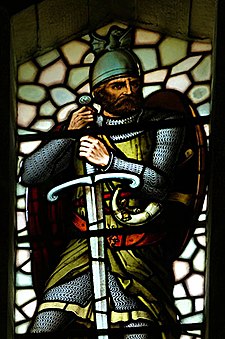Portal:Scotland
| Main Page | Selected articles 1 | Selected articles 2 | Selected biographies | Selected quotes | Selected pictures | Featured Content | Categories & Topics |
Introduction
 |

|
|

| ||
Scotland (Scots: Scotland; Scottish Gaelic: Alba) is a country that is part of the United Kingdom. It contains nearly one-third of the United Kingdom's land area, consisting of the northern part of the island of Great Britain and more than 790 adjacent islands, principally in the archipelagos of the Hebrides and the Northern Isles. To the south-east, Scotland has its only land border, which is 96 miles (154 km) long and shared with England; the country is surrounded by the Atlantic Ocean to the north and west, the North Sea to the north-east and east, and the Irish Sea to the south. The population in 2022 was 5,439,842 and accounts for 8% of the population of the UK. Edinburgh is the capital and Glasgow is the largest of the cities of Scotland.
The Kingdom of Scotland emerged as an independent sovereign state in the 9th century. In 1603, James VI inherited the Kingdom of England and the Kingdom of Ireland, forming a personal union of the three kingdoms. On 1 May 1707 Scotland and England combined to create the new Kingdom of Great Britain, with the Parliament of Scotland subsumed into the Parliament of Great Britain. In 1999 a Scottish Parliament was re-established, and has devolved authority over many areas of domestic policy. The country has a distinct legal system, educational system, and religious history from the rest of the UK, which have all contributed to the continuation of Scottish culture and national identity. Scottish English and Scots are the most widely spoken languages in the country, existing on a dialect continuum with each other. Scottish Gaelic speakers can be found all over Scotland, however the language is largely spoken natively by communities within the Hebrides. The number of Gaelic speakers numbers less than 2% of the total population, though state-sponsored revitalisation attempts have led to a growing community of second language speakers.
The mainland of Scotland is broadly divided into three regions: the Highlands, a mountainous region in the north and north-west; the Lowlands, a flatter plain across the centre of the country; and the Southern Uplands, a hilly region along the southern border. The Highlands are the most mountainous region of the British Isles and contain its highest peak, Ben Nevis, at 4,413 feet (1,345 m). The region also contains many lakes, called lochs; the term is also applied to the many saltwater inlets along the country's deeply indented western coastline. The geography of the many islands is varied. Some, such as Mull and Skye, are noted for their mountainous terrain, while the likes of Tiree and Coll are much flatter. (Full article...)
Selected article

St Kilda (Scottish Gaelic: Hiort) is a remote archipelago situated 64 kilometres (40 mi) west-northwest of North Uist in the North Atlantic Ocean. It contains the westernmost islands of the Outer Hebrides of Scotland. The largest island is Hirta, whose sea cliffs are the highest in the United Kingdom; three other islands (Dùn, Soay and Boreray) were also used for grazing and seabird hunting. The islands are administratively a part of the Comhairle nan Eilean Siar local authority area.
The origin of the name St Kilda is a matter of conjecture. The islands' human heritage includes numerous unique architectural features from the historic and prehistoric periods, although the earliest written records of island life date from the Late Middle Ages. The medieval village on Hirta was rebuilt in the 19th century, but illnesses brought by increased external contacts through tourism, and the upheaval of the First World War, contributed to the island's evacuation in 1930. The story of St Kilda has attracted artistic interpretations, including Michael Powell's film The Edge of the World and an opera.
Permanent habitation on the islands possibly extends back two millennia, the population probably never exceeding 180; its peak was in the late 17th century. The population was 112 in 1851. According to the 1861 census, there were 71 inhabitants at that time; over subsequent years, the population ebbed and waned, eventually dropping to 36 as of May 1930. Virtually all of the population lived on Hirta. The entire remaining population was evacuated from Hirta, by then the only inhabited island, in 1930.
Selected quotes
" ... Beauty in things exists in the mind which contemplates them ... "
" ... We often discover what will do, by finding out what will not do; and probably he who never made a mistake never made a discovery ... "
In the news

- 7 May 2024 – Premiership of John Swinney
- The Scottish Parliament votes to elect John Swinney as First Minister of Scotland with 64 votes in favour and seven abstentions from the Scottish Greens. (BBC News)
- 6 May 2024 – 2024 Scottish National Party leadership election
- John Swinney is elected leader of the Scottish National Party following the resignation of First Minister Humza Yousaf. (The Guardian)
- 4 May 2024 – International reactions to the Israel–Hamas war
- Palestinian doctor and rector at the University of Glasgow Ghassan Abu-Sittah is denied entry into France after landing at Charles de Gaulle airport on his way to speak at the French Senate. Last month, he was denied entry into Germany. (Al Jazeera)
- 1 May 2024 – 2024 Scottish government crisis
- The Scottish National Party administration survives the vote of no confidence earlier this week, prompting the party to seek a replacement for outgoing First Minister Humza Yousaf. (Al Jazeera)
- 29 April 2024 – 2024 Scottish government crisis
- Ahead of a planned vote of no confidence, Scottish First Minister Humza Yousaf announces that he will resign from office. (CNBC) (The New York Times)
- 25 April 2024 – 2024 Scottish government crisis
- Premiership of Humza Yousaf
Selected biography

Sir William Wallace (Scottish Gaelic: Uilleam Uallas, pronounced [ˈɯʎam ˈuəl̪ˠəs̪]; Norman French: William le Waleys; c. 1270 – 23 August 1305) was a Scottish knight who became one of the main leaders during the First War of Scottish Independence.
Along with Andrew Moray, Wallace defeated an English army at the Battle of Stirling Bridge in September 1297. He was appointed Guardian of Scotland and served until his defeat at the Battle of Falkirk in July 1298. In August 1305, Wallace was captured in Robroyston, near Glasgow, and handed over to King Edward I of England, who had him hanged, drawn and quartered for high treason and crimes against English civilians.
Since his death, Wallace has obtained a legendary status beyond his homeland. He is the protagonist of Blind Harry's 15th-century epic poem The Wallace and the subject of literary works by Jane Porter and Sir Walter Scott, and of the Academy Award-winning film Braveheart.
Selected picture
Traigh Iar (Horgabost beach), Harris.
Photo credit: Gordon Hatton
Did You Know...

- ... that Carrbridge Packhorse Bridge is the oldest-known stone bridge in the Scottish Highlands?
- ... that Grey Gowrie, while holding office under Margaret Thatcher, described himself as "Irishman with a Scots name and a German wife, working, somewhat to his surprise, for a very English government"?
- ... that former Scottish Conservative leader Ruth Davidson said that she would swim in Loch Ness naked if the SNP won more than 50 seats at the 2019 United Kingdom general election?
- ... that today the Bishop of Edinburgh plays a ceremonial role at the coronation of Charles III and Camilla as a representative of the Walker Trustees?
- ... that the Scottish medical missionary Ernest Muir championed the use of the traditional Ayurvedic cure chaulmoogra oil in treating Hansen's disease (leprosy)?
- ... that Ian Begg, known for his work on restoration of castles in Scotland, designed and built his own 20th-century tower house to live in?
- ... that Julia Dawson's first Clarion Van was named for Scottish socialist Caroline Martyn?
- ... that the Scottish judge Lord Duthie served as an officer in the Royal Naval Reserve?
Get involved
For editor resources and to collaborate with other editors on improving Wikipedia's Scotland-related articles, see WikiProject Scotland.
To get involved in helping to improve Wikipedia's Scotland related content, please consider doing some of the following tasks or joining one or more of the associated Wikiprojects:
- Visit the Scottish Wikipedians' notice board and help to write new Scotland-related articles, and expand and improve existing ones.
- Visit Wikipedia:WikiProject Scotland/Assessment, and help out by assessing unrated Scottish articles.
- Add the Project Banner to Scottish articles around Wikipedia.
- Participate in WikiProject Scotland's Peer Review, including responding to PR requests and nominating Scottish articles.
- Help nominate and select new content for the Scotland portal.
Do you have a question about The Scotland Portal that you can't find the answer to?
Post a question on the Talk Page or consider asking it at the Wikipedia reference desk.
Related portals
Other language versions
Associated Wikimedia
The following Wikimedia Foundation sister projects provide more on this subject:
-
Commons
Free media repository -
Wikibooks
Free textbooks and manuals -
Wikidata
Free knowledge base -
Wikinews
Free-content news -
Wikiquote
Collection of quotations -
Wikisource
Free-content library -
Wikispecies
Directory of species -
Wikiversity
Free learning tools -
Wikivoyage
Free travel guide -
Wiktionary
Dictionary and thesaurus







































